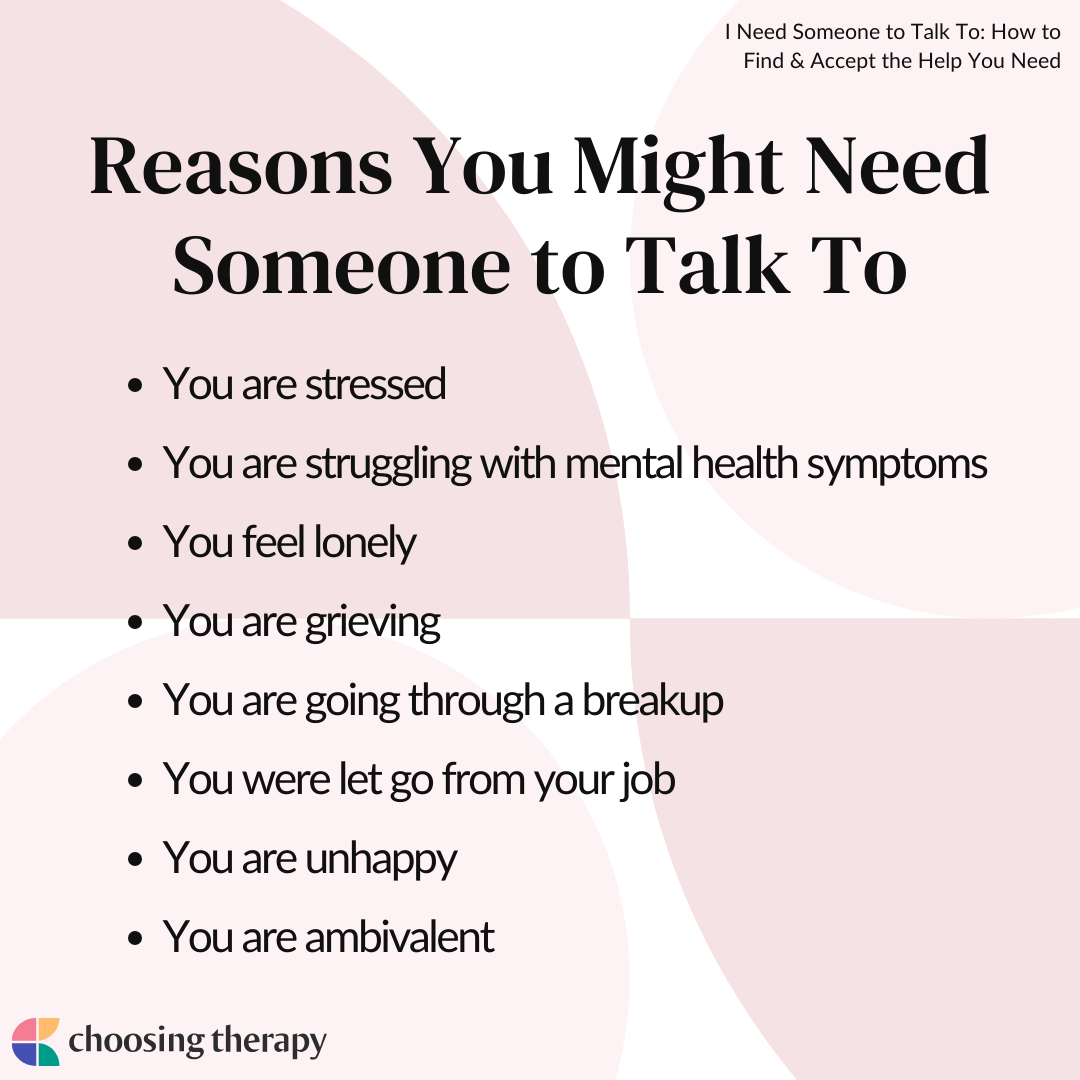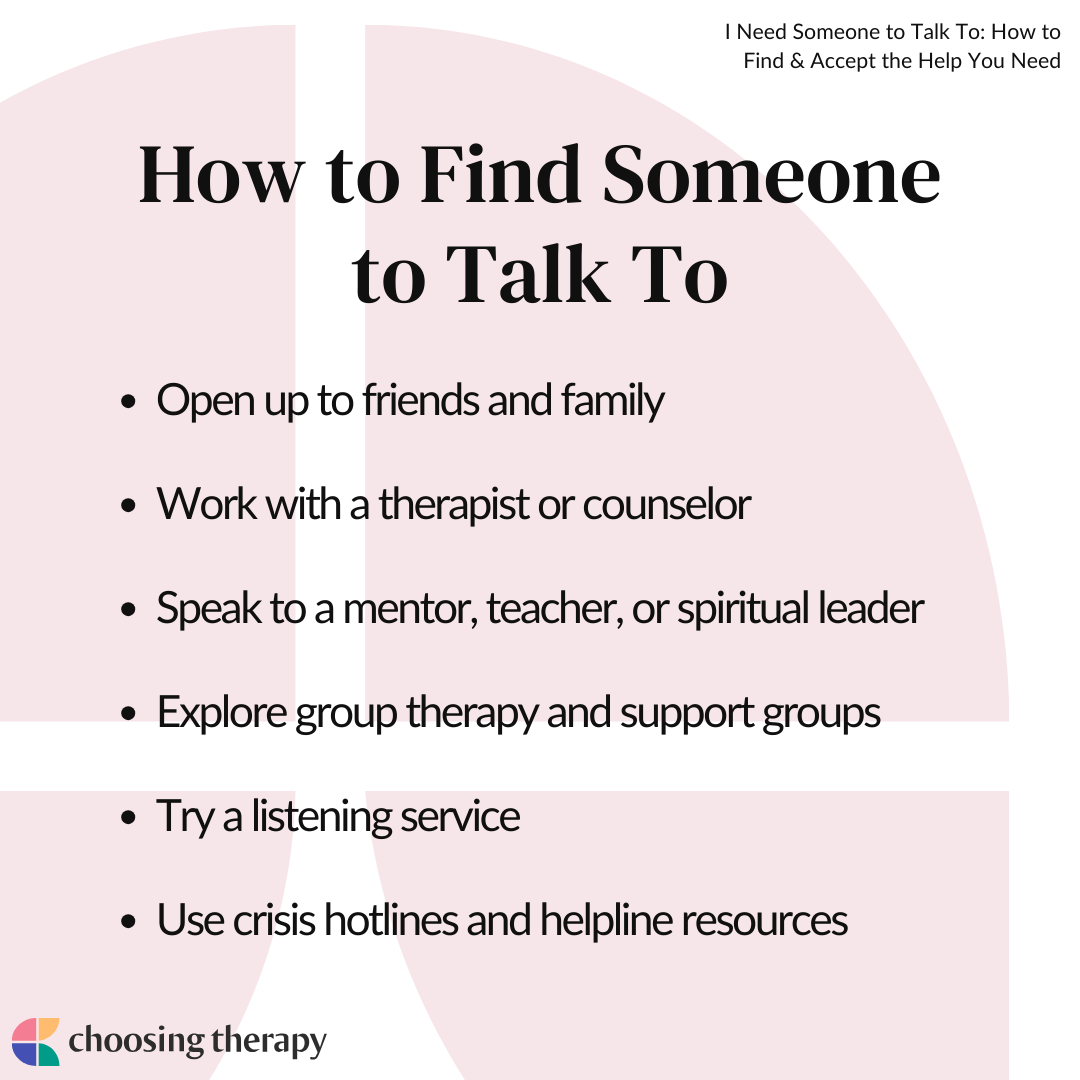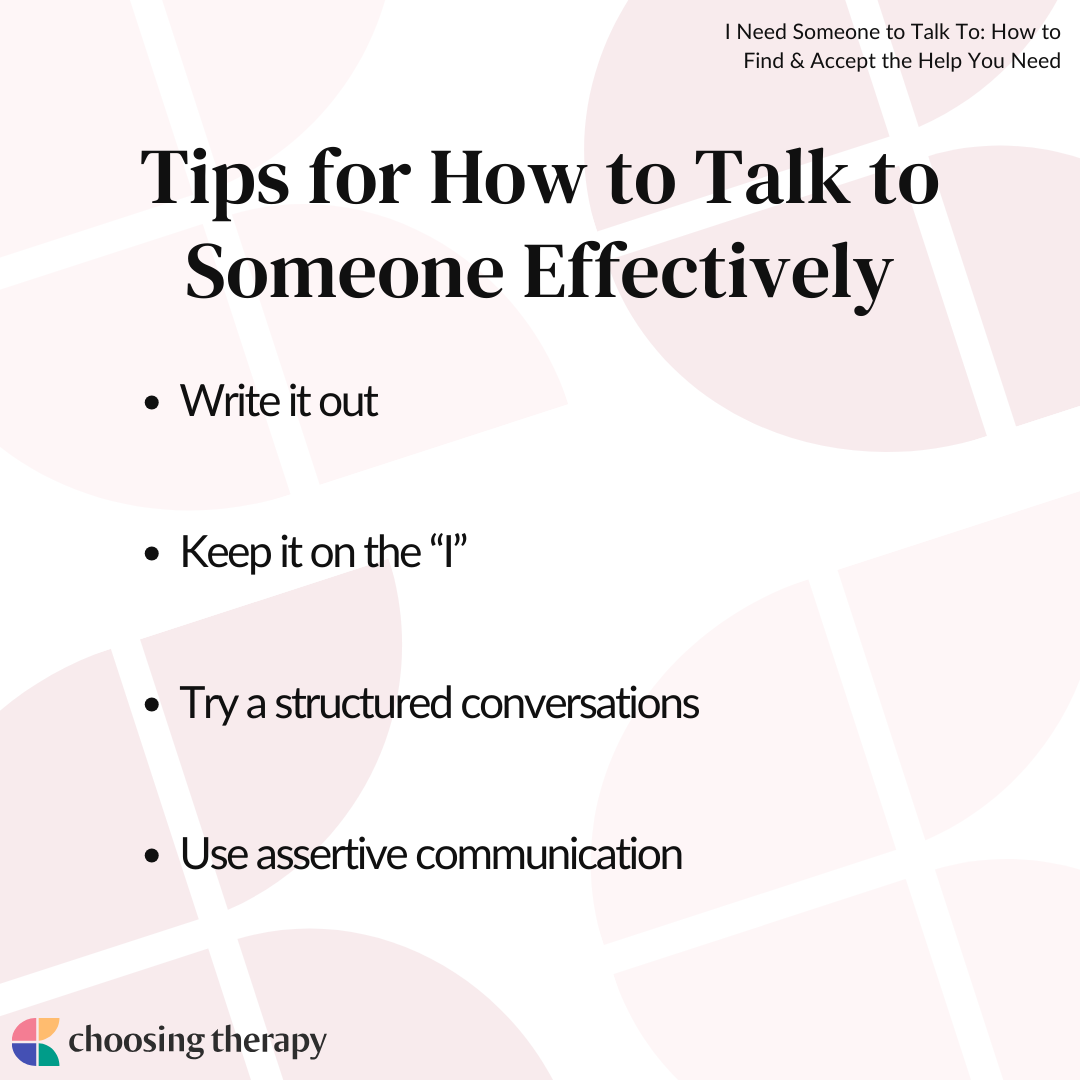Acknowledging we need support is half the battle. Finding and then truly accepting help is the other half. It can be difficult to allow ourselves to be supported. This is due to a multitude of reasons. Thankfully, there are many avenues for finding someone to talk to. Your own unique circumstances will guide where you seek support.
Would you like to try therapy? BetterHelp has over 20,000 licensed therapists who provide convenient and affordable online therapy. BetterHelp starts at $65 per week. Take a Free Online Assessment and get matched with the right therapist for you.
Reasons You Might Need Someone to Talk To
Stressors are often the main reason we may need to talk to someone. Stress impacts our bodies and can leave us feeling emotionally, psychologically, and physically depleted.1 Additionally, untreated mental health concerns can amplify when additional stressors come into play. There may be a singular reason you might need someone to talk to or a combination of reasons.
Reasons you may need someone to talk to include:
- You are stressed: When we feel stressed, we hold tension mentally and physically. This psychological and physiological tension can manifest into headaches, stomach aches, fatigue, snapping at people over something unreasonable, and the list goes on.1
Stress may be a central reason to talk to someone. - You are struggling with mental health symptoms: Mental health conditions can cause a host of different feelings, negative thoughts, and self-destructive behaviors. At a certain point, symptoms could start to impact our daily functioning, relationships, work/school performance, and quality of life.2 When these areas begin to feel the impact, talking to someone may hold the key to healing.
- You feel lonely: Loneliness can feel debilitating. It can lead us to question our self-worth, which may, in turn, result in mental health concerns such as depression. Talking to someone and reaching out when loneliness becomes the core of our feelings is important.
- You are grieving: Loss affects us all differently. There is no right way to grieve. At times, grief can overshadow the entirety of our lives, making it more likely for us to need additional support in place.
- You are going through a breakup: Breakups can also prompt a grieving period, especially if we were invested fully in our former partner. A breakup can leave us questioning our worth, which can reinforce our need to talk to someone.
- You were let go from your job: Job loss is particularly devastating. The fallout can include financial stress and feeling like we have no real purpose. Talking to someone can make us feel supported and help us find that sense of purpose again.
- You are unhappy: Unhappiness happens to all of us. It does not always mean we are experiencing a mental health concern. However, unhappiness can persist in our day-to-day mood. Whether this feeling of unhappiness permeates most of our day or occurs here and there, it is beneficial to talk to someone about the why behind these feelings
- You are ambivalent: Ambivalence is being of two minds about something, which can cause internal confusion and constant uncertainty.3 When it is hard to make a decision or to find a middle ground, talking to someone can support us in making a choice based on our values.
Why it Is Important to Talk to Someone
Numerous studies have shown that social support is vital to our well-being and fosters resiliency.4 Having someone to talk to reduces recurrent feelings of being alone and misunderstood. It also allows one to put into words things they have been thinking and feeling for quite some time.
Why It Can Be Difficult to Talk to Someone
One key reason it can be difficult to talk to someone is many of us have been disappointed and hurt when opening up in the past.6 Additionally, it is common to be afraid of being rejected by others when we are being our authentic selves. It can feel easier to avoid talking to someone than to make the effort and not be received.
How to Overcome Barriers that Prevent You From Talking
It is possible to overcome barriers that prevent you from talking. Begin by understanding what barriers are ahead of you to plan a workaround. There are some barriers, such as how others may respond, that are out of your hands. Focusing your energy on what you can control is more important, including how much you share and who you open up to.
Here are some suggestions for how to overcome barriers that prevent you from talking:
- Identify and acknowledge your barriers: Reflection is a vital part of resolving barriers. The more aware you are of what stands in your way, the better able you can be to plan and problem-solve. Sharing your personal barriers with the person you wish to talk to is a good first step.
- Practice self-compassion: Practicing self-compassion is an act of self-care. Regarding barriers to talking to someone, showing yourself a little more tender love and care is important. If you can show yourself compassion, you can feel more secure in someone you are talking to showing you the same.
- Write it down: A lot of the time, it is hard to know what to say when you want to talk to someone. You may have a general idea, but it can feel disjointed. Writing it down can give you clarity and can make talking to another person easier as you have a point of reference.
- Set realistic expectations: Sometimes, expectations can get the better of us. However, if you approach expectations realistically, you can account for the duality of good and not-so-good outcomes. For example, it is realistic to say, “Being vulnerable is hard for me, and I could benefit from opening up.” Both sentiments are equally true and can work in tandem.
- Focus on the benefits: Talking to someone comes with a host of benefits, including but not limited to feeling understood and feeling as if a weight is lifted off one’s shoulders when not bearing it alone. When we focus on the potential benefits, it helps to reduce our skepticism toward receiving help.
- Consider the consequences of not seeking help: Ask yourself, what are the potential consequences if I do not talk to someone about how I am feeling? They could be vast depending on the reason for wanting to talk to someone. It is possible mental health symptoms could get worse, or you feel even more alone. With these consequences considered, seeking help does not seem so bad after all.
How to Find Someone to Talk To
The first step in finding someone to talk to is identifying who you trust enough to open up. You could turn to a close friend, sibling, or cousin. You could speak to a therapist or turn to a spiritual leader. Support groups are also a great option. You can also talk with multiple people to create a village of support.
Finding the best fit for our needs and concerns can take time. Whether it is someone in your family, a friend, or a professional, opening up is hard. You may start to open up to one person and then feel that continuing does not feel right. It can take a bit of trial and error to find the right person.
Top Rated Online Therapy Services BetterHelp – Best Overall “BetterHelp is an online therapy platform that quickly connects you with a licensed counselor or therapist and earned 4 out of 5 stars.” Get 20% off your first month! Visit BetterHelp Talkspace - Best For Insurance Talkspace accepts many insurance plans including Optum, Cigna, and Aetna. Typical co-pay is $30, but often less. Visit Talkspace
Here are six ways to find someone to talk to:
1. Open Up to Friends & Family
Opening up to friends and family may be the obvious choice, but can also be the toughest. It can feel uncomfortable to open up to someone who you are close with, will see often, and who may judge you on a personal level. However, oftentimes, once you have started, those negative feelings fall away when your trusted person validates and hears you.
To start, begin with where you are at, to the extent that you feel comfortable. For example, “I wanted to talk because I have been feeling really down lately and felt it was important I talk about it with someone I feel I can trust.” Once you have laid down your feelings, the ball is in the other person’s court to respond, whether it be verbally, with a hug, or through some other reassuring mannerism.
2. Work With a Therapist or Counselor
There is extreme value in seeking help from mental health professionals, therapists, or counselors. Therapists and counselors are trained to meet you exactly where you are without judgment. Therapy has been shown to reduce a person’s symptoms, improve quality of life, and teach coping skills beyond the therapy room.5
If you are worried about cost, affordable therapy options are available. Obtaining free or low-cost therapy depends on a variety of factors. These factors include insurance coverage, location, income, and/or other pre-existing medical conditions. It is important to call your insurance and understand your benefits.
To find a therapist, you can use an online therapist directory to search for therapist in your area who specialize in your particular concerns. Alternatively, an online therapy platform can provide you with therapists who practice virtual therapy, thereby making therapy easily accessible from the comfort of your own home.
3. Speak to a Mentor, Teacher, or Spiritual Leader
Many mentors, teachers, and religious or spiritual guides offer support to those struggling with a variety of life transitions and circumstances. While some mentors, teachers, pastoral or spiritual counselors may have training in mental health, it is important to note that these supports may not necessarily be grounded in mental health. Seeking support from a licensed professional is recommended. There are a growing number of mental health professionals who specialize their work in religiosity and spirituality, as well as life coaching.
4. Explore Group Therapy & Support Groups
There are many benefits to joining group therapy, support groups, or self-help groups. These groups foster a sense of belonging and hope in group members’ lives. Additionally, group members can support one another in making meaning out of the circumstances that brought them to treatment in the first place.7 Group therapy and support groups can be found online or in person.
5. Try a Listening Service
Sometimes, we may just need someone to listen in a compassionate and caring way. If you are not ready to talk with a trusted friend, family member, therapist, etc., listening services may be the right step for you. 7 Cups is one of many different listening service platforms. Listeners are volunteers with training in active listening and compassionate, person-centered communication.
6. Use Crisis Hotlines & Helpline Resources
There is a great deal of availability of crisis hotlines and helplines for those needing someone to talk to. A multitude of federal and state oversights offer additional support. Whether it is having a person to talk to for the moment, getting a referral, or receiving support through a crisis, online platforms and crisis lines often have flexible hours with dedicated persons on the other end of the line.
Here are some useful online platforms and crisis lines:
- Suicide & Crisis Lifeline: The Suicide & Crisis Lifeline can be reached 24/7/365 by dialing 988, texting 988, or going to their website to chat with a trained lifeline counselor. For Veterans, you can dial 988 and press option 1, text 838255, or go to the veterans crisis line to chat with someone today.
- National Alliance for Mental Illness (NAMI): NAMI provides helplines that are available throughout the week, usually during the morning through the later evening. To reach NAMI’s national helpline, you can call, text, or email them Monday through Friday, 10 AM – 10 PM, at 1-800-950-NAMI (6264), text “HelpLine” to 62640 or email [email protected].
- Substance Abuse and Mental Health Services Administration (SAMHSA) National Helpline: The SAMHSA Helpline is a free, confidential, 24/7/365 referral service for individuals and families with substance use and mental health concerns. SAMHSA’s Helpline will connect you with treatment programs in your area. You can reach the helpline by calling 1-800-662-HELP (4357).
- The Trevor Project: The Trevor Project is a free, confidential, 24/7/365 lifeline for LGBTQI+ persons. You can call 1-866-488-7386, text ‘START’ to 678-678, or chat.
- Crisis Text Line: The Crisis Text Line is a service for people in crisis. They have trained crisis counselors available in the United States and internationally. You can reach a trained crisis counselor by texting ‘HOME’ to 741741. You can also chat with them or reach them via WhatsApp.
- American Psychological Association (APA) Crisis Hotline & Resource List: APA Crisis Hotline & Resource List has additional resources based on your specific situation and need, from alcohol use disorder to domestic violence helplines.
Tips for How to Talk to Someone Effectively
Effective communication is key to getting your main points across to those in your support circle, as well as receiving any thoughts or constructive feedback they may have. When feeling on edge, stressed, or being “too in your head,” it can be hard to express your thoughts and feelings. You can express yourself more clearly with a variety of different communication skills.
Here are some tips for effectively communicating:
- Write it out: Talking about our thoughts and feelings can be intimidating. Putting them on paper can help you organize yourself as you prepare to talk about what is hard.
- Keep it on the “I”: “I” statements are a hallmark of effective communication. When we keep things on the “I”, “I feel”, “I think”, we lessen the chance of the other person(s) in the conversation feeling attacked. This is helpful in lessening the chance for defensiveness and keeping the lines of communication open.
- Try a structured conversation: A structured conversation is where each person’s needs are considered in the conversation, focusing on one important communication skill (i.e., active listening) and rounding out the conversation with positive reinforcement. This type of conversation style can help one to stay focused and take into consideration the other party(ies) of the conversation.
- Use assertive communication: Assertive communication is the middle ground between passive and aggressive communication. When speaking assertively, you are firm and clear while also being compassionate and understanding. This type of conversation style is helpful as it keeps the conversation direct while also keeping your and the other person’s needs in mind.
How to Help Yourself While Looking for Someone to Talk To
Practicing self-help is a way to embrace and support oneself while looking to bolster the support around you. As cliche as it may sound, the better relationship we have with ourselves, the better our relations with others.
A few practices to consider are: First, be mindful of how you talk to yourself and about yourself. Additionally, consider journaling as a means of better understanding your thought patterns and how your feelings manifest. Lastly, use positive affirmations to challenge any negative thoughts you have about yourself. There are also many self-improvement books and self-help podcasts available to support your journey.
In My Experience
To help our readers take the next step in their mental health journey, Choosing Therapy has partnered with leaders in mental health and wellness. Choosing Therapy is compensated for marketing by the companies included below. Online Therapy BetterHelp – Get support and guidance from a licensed therapist. BetterHelp has over 20,000 therapists who provide convenient and affordable online therapy. Take A Free Online Assessment and get matched with the right therapist for you. Free Assessment Online Psychiatry Hims / Hers If you’re living with anxiety or depression, finding the right medication match may make all the difference. Connect with a licensed healthcare provider in just 12 – 48 hours. Explore FDA-approved treatment options and get free shipping, if prescribed. No insurance required. Get Started Medication + Therapy Brightside Health – Together, medication and therapy can help you feel like yourself, faster. Brightside Health treatment plans start at $95 per month. United Healthcare, Anthem, Cigna, and Aetna accepted. Following a free online evaluation and receiving a prescription, you can get FDA approved medications delivered to your door. Free Assessment Starting Therapy Newsletter A free newsletter for those interested in learning about therapy and how to get the most benefits out of therapy. Get helpful tips and the latest information. Sign Up Choosing Therapy Directory You can search for therapists by specialty, experience, insurance, or price, and location. Find a therapist today.Additional Resources
Best Online Therapy Services There are a number of factors to consider when trying to determine which online therapy platform is going to be the best fit for you. It’s important to be mindful of what each platform costs, the services they provide you with, their providers’ training and level of expertise, and several other important criteria.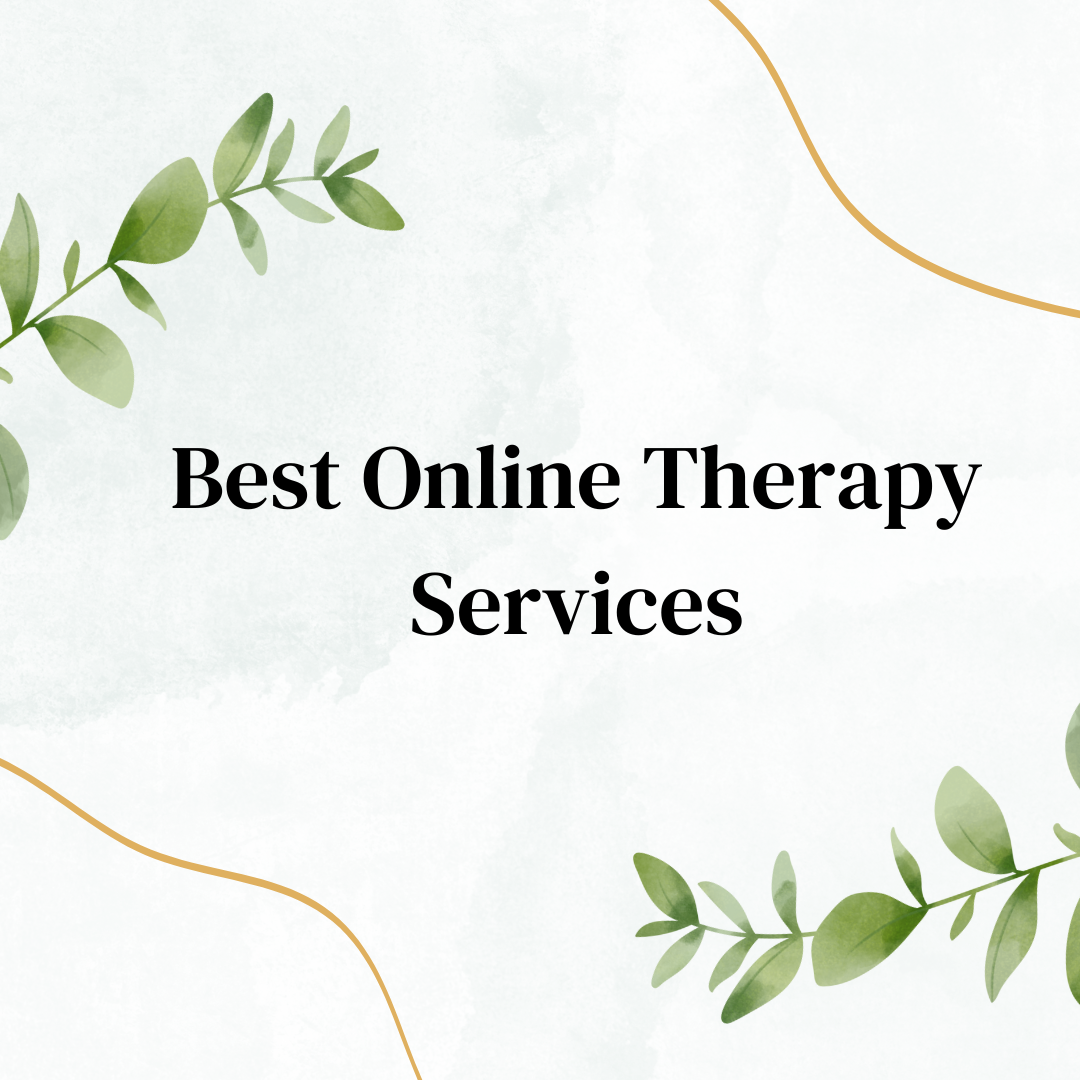
What is Exposure & Response Prevention Therapy? With so much information out there regarding providers and treatment options for obsessive compulsive disorder, it can be hard to know exactly where to start—especially when you have to consider everything from the type of provider to the different treatment methods, as well as how you’ll fit it into your busy schedule.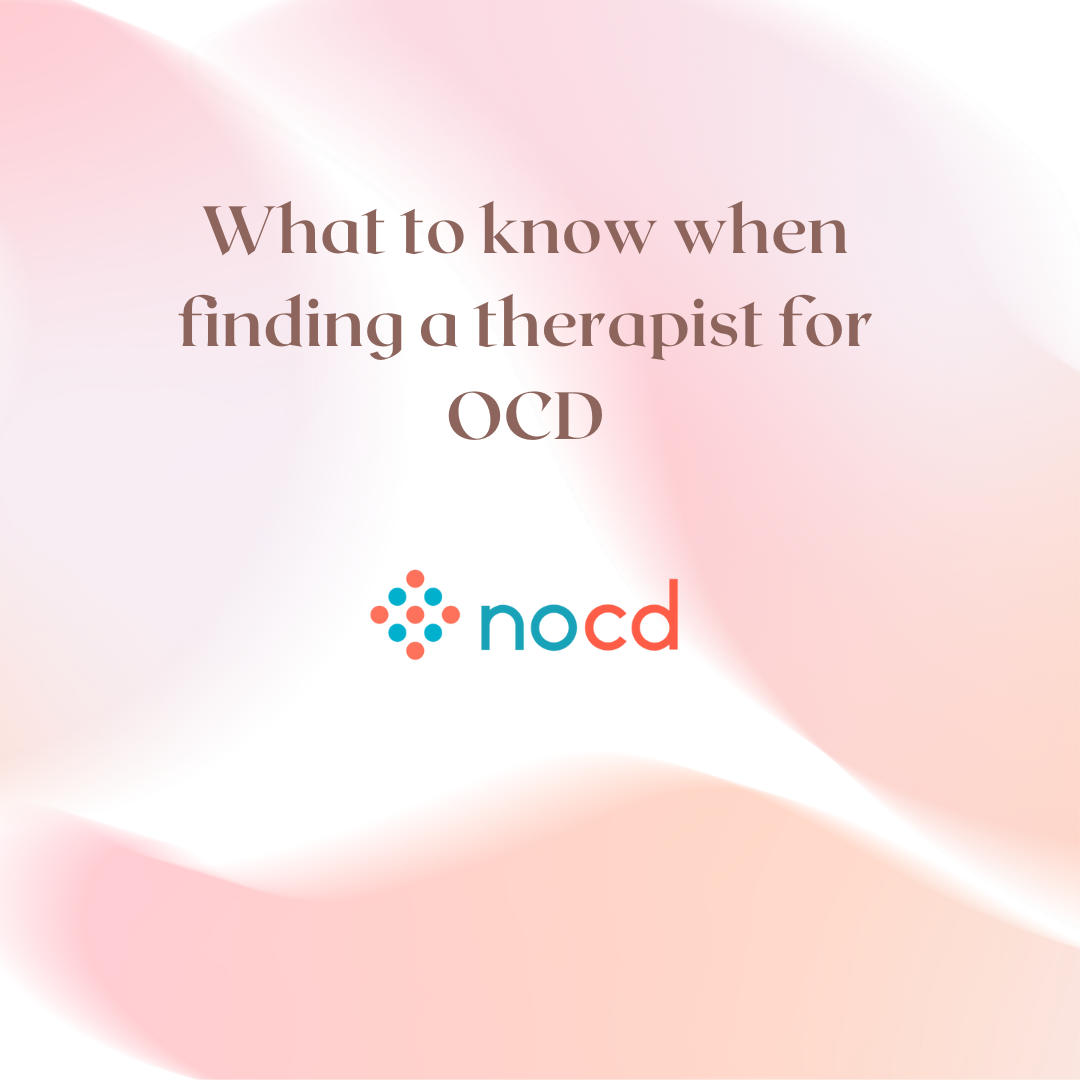
I Need Someone to Talk To Infographics
